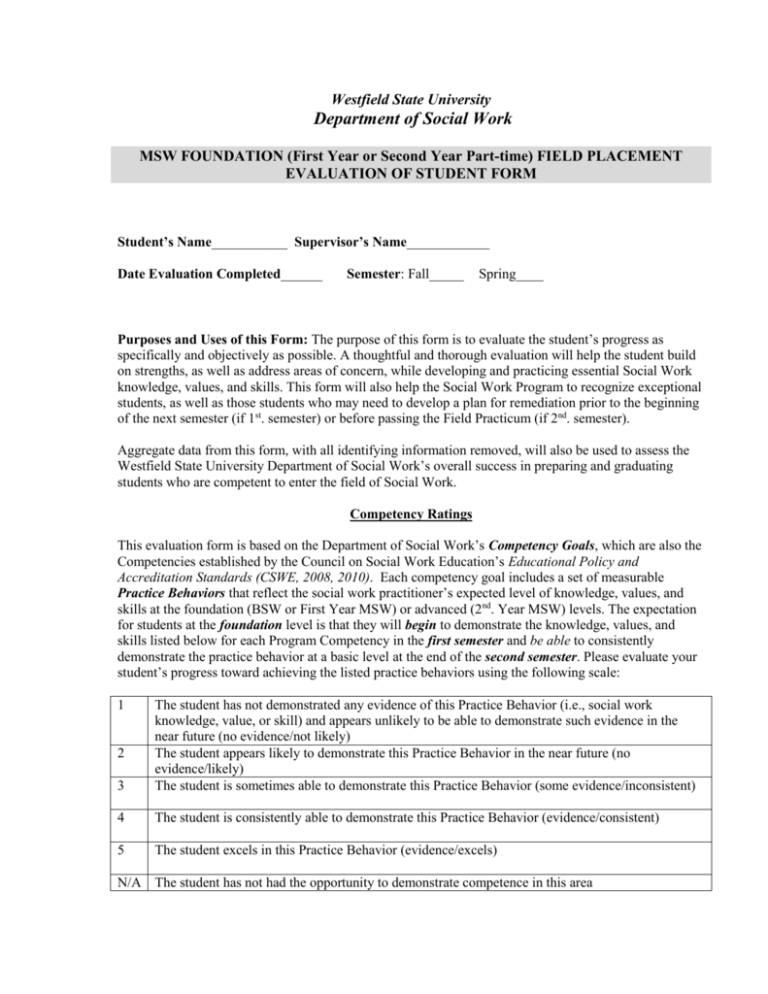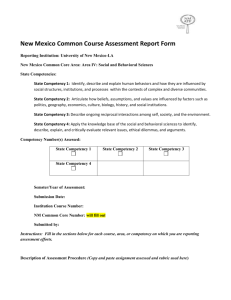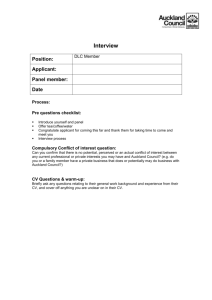Department of Social Work - Westfield State University
advertisement

Westfield State University Department of Social Work MSW FOUNDATION (First Year or Second Year Part-time) FIELD PLACEMENT EVALUATION OF STUDENT FORM Student’s Name___________ Supervisor’s Name____________ Date Evaluation Completed______ Semester: Fall_____ Spring____ Purposes and Uses of this Form: The purpose of this form is to evaluate the student’s progress as specifically and objectively as possible. A thoughtful and thorough evaluation will help the student build on strengths, as well as address areas of concern, while developing and practicing essential Social Work knowledge, values, and skills. This form will also help the Social Work Program to recognize exceptional students, as well as those students who may need to develop a plan for remediation prior to the beginning of the next semester (if 1st. semester) or before passing the Field Practicum (if 2nd. semester). Aggregate data from this form, with all identifying information removed, will also be used to assess the Westfield State University Department of Social Work’s overall success in preparing and graduating students who are competent to enter the field of Social Work. Competency Ratings This evaluation form is based on the Department of Social Work’s Competency Goals, which are also the Competencies established by the Council on Social Work Education’s Educational Policy and Accreditation Standards (CSWE, 2008, 2010). Each competency goal includes a set of measurable Practice Behaviors that reflect the social work practitioner’s expected level of knowledge, values, and skills at the foundation (BSW or First Year MSW) or advanced (2nd. Year MSW) levels. The expectation for students at the foundation level is that they will begin to demonstrate the knowledge, values, and skills listed below for each Program Competency in the first semester and be able to consistently demonstrate the practice behavior at a basic level at the end of the second semester. Please evaluate your student’s progress toward achieving the listed practice behaviors using the following scale: 1 3 The student has not demonstrated any evidence of this Practice Behavior (i.e., social work knowledge, value, or skill) and appears unlikely to be able to demonstrate such evidence in the near future (no evidence/not likely) The student appears likely to demonstrate this Practice Behavior in the near future (no evidence/likely) The student is sometimes able to demonstrate this Practice Behavior (some evidence/inconsistent) 4 The student is consistently able to demonstrate this Practice Behavior (evidence/consistent) 5 The student excels in this Practice Behavior (evidence/excels) 2 N/A The student has not had the opportunity to demonstrate competence in this area Summary Ratings Table Practice Behavior 1 no evidence/ unlikely 2 no evidence/ likely 3 some evidence/ inconsistent 4. evidence/ consistent 5. evidence/ excels N/A Please check the appropriate box in the ratings tables below to indicate your evaluation of the student’s level of competence in each area at the time of the evaluation. If you wish, you may also explain your ratings or make comments in the space following each rating scale. EVALUATION CRITERIA AND RATINGS TABLES Program Competency 1: The student Identifies as a professional social worker and conducts himself or herself accordingly, as demonstrated by the ability to: 1. advocate for client access to the services of social work 2. practice personal reflection and self-correction to assure continual professional development 3. attend to professional roles and boundaries 4. demonstrate professional demeanor in behavior, appearance, and communication 5. engage in career-long learning 6. use supervision and consultation 1 2 3 4 5 N/A 1 2 3 4 5 N/A 1 1 2 2 3 3 4 4 5 5 N/A N/A 1 1 2 2 3 3 4 4 5 5 N/A N/A Comments: Program Competency 2: The student conducts his or her professional practice according to the values and ethical principles of professional social work, as demonstrated by the ability to: 1. recognize and manage personal values in a way that allows professional values to guide practice 2. make ethical decisions by applying standards of the National Association of Social Workers Code of Ethics and, as applicable, of the International Federation of Social Workers/International Association of Schools of Social Work Ethics in Social Work, Statement of Principles 3. tolerate ambiguity in resolving ethical conflicts 4. apply strategies of ethical reasoning to arrive at principled decisions Comments: 2 1 2 3 4 5 N/A 1 2 3 4 5 N/A 1 1 2 2 3 3 4 4 5 5 N/A N/A Program Competency 3: The student applies critical thinking and communication skills to evaluate and inform professional judgments in practice, as demonstrated by the ability to: 1. distinguish, appraise, and integrate multiple sources of knowledge, including research-based knowledge and practice wisdom 2. analyze models of assessment, prevention, intervention, and evaluation 3. demonstrate effective oral and written communication in working with individuals, families, groups, organizations, communities, and colleagues 1 2 3 1 2 3 1 2 3 5 N/A 4 5 N/A 4 5 N/A Comments: Program Competency 4: The student engages in informed, sensitive, and competent practice with diverse and oppressed groups, as demonstrated by the ability to: 1. recognize the extent to which a culture’s structures and values may oppress, marginalize, alienate, or create or enhance privilege and power 2. gain self-awareness in order to eliminate the influence of personal biases and values in working with diverse groups 3. recognize and communicate his or her understanding of the importance of difference in shaping life experiences 4. view herself or himself as a learner and clients as experts on their own experiences 1 2 3 4 5 N/A 1 2 3 4 5 N/A 1 2 3 4 5 N/A 1 2 3 4 5 N/A Comments: Program Competency 5: The student promotes human rights and social and economic justice, as demonstrated by the ability to: 1. understand the forms and mechanisms of oppression and discrimination 2. understand the importance of advocating for human rights and social and economic justice 3. engage in practices that promote human rights and social and economic justice. Comments: 3 1 2 3 4 5 N/A 1 2 3 4 5 N/A 1 2 3 4 5 N/A Program Competency 6: The student engages in research-informed practice and practice-informed research, as demonstrated by the ability to: 1. use practice experience to inform scientific inquiry 2. use research evidence to inform practice 1 1 2 2 3 3 4 4 5 5 N/A N/A Comments: Program Competency 7: The student applies knowledge of human behavior and the social environment to professional practice, as demonstrated by the ability to: 1. utilize conceptual frameworks to guide the processes of assessment, intervention, and evaluation 2. critique and apply knowledge to understand person and environment 1 2 3 4 5 N/A 1 2 3 4 5 N/A Comments Program Competency 8: The student engages in policy practice to promote social and economic wellbeing and to deliver effective services, as demonstrated by the ability to: 1. analyze, formulate, and advocate for policies that advance social well-being 2. collaborate with colleagues and clients in developing and implementing effective policy action 1 2 3 4 5 N/A 1 2 3 4 5 N/A Comments: Program Competency 9: The student recognizes and responds to the dynamic contexts that shape practice, as demonstrated by the ability to: 1. continuously discover, appraise, and attend to changing locales, populations, scientific and technological developments, and emerging societal trends to provide relevant services 2. provide leadership in promoting sustainable changes in service delivery and practice to improve the quality of social services. Comments: 4 1 2 3 4 5 N/A 1 2 3 4 5 N/A Program Competency 10: The student has acquired the knowledge and skills required for engaging, assessing, intervening and evaluating with individuals, families, groups, organizations, and communities, as demonstrated by the ability to: 1. engage in professional practice involving the dynamic and interactive processes of engagement, assessment, intervention, and evaluation at multiple levels. 2. demonstrate practice knowledge including identifying, analyzing, and implementing evidence-based interventions designed to achieve client goals; using research and technological advances; evaluating program outcomes and practice effectiveness. 1 2 3 4 5 N/A 1 2 3 4 5 N/A Comments: Program Competency 10a: The student has basic knowledge and skills required to engage client systems, as demonstrated by the ability to: 1. substantively and effectively prepare for action with individuals, families, groups, organizations, and communities 2. use empathy and other interpersonal skills 1 2 3 4 5 N/A 1 2 3 4 5 N/A 3. collaborate with clients to develop mutually agreed-on focus of work and outcomes 1 2 3 4 5 N/A Comments: Program Competency 10b: The student has the basic knowledge and skills required for assessment of client systems, as demonstrated by the ability to: 1. collect, organize, and interpret client data 2. assess client strengths and limitations 3. collaborate upon mutually agreed-on intervention goals and objectives; and 4. select appropriate intervention strategies. 1 1 1 2 2 2 3 3 3 4 4 4 5 5 5 N/A N/A N/A 1 2 3 4 5 N/A Comments: Program Competency 10c: The student has the knowledge and skills required for the assessment of client systems of all sizes, as demonstrated by the ability to: 1. initiate actions to achieve organizational goals 1 2 3 4 5 N/A 2. help clients resolve problems 1 2 3 4 5 N/A 3. negotiate, mediate, and advocate for clients 1 2 3 4 5 N/A Comments: 5 Program Competency 10d: The student has the basic knowledge and skills required for evaluating client systems of all sizes, as demonstrated by the ability to: 1. critically analyze, monitor, and evaluate interventions at the beginning stages of the process 2. use ongoing monitoring and evaluation processes to improve practice at all stages and levels of intervention 1 2 3 4 5 N/A 1 2 3 4 5 N/A Comments: SUMMARY AND RECOMMENDATIONS 1. Please identify this student’s three most significant strengths. 2. Please identify this student’s three most significant areas for improvement. 3. Do you have any additional comments about or recommendations for this student? Recommended Grade: Please indicate the overall evaluation of the student’s field performance by circling the recommended grade. A (outstanding) B (above average) C (average) _______________________________ Supervisor / Date 6 D (below average) F (fail)







